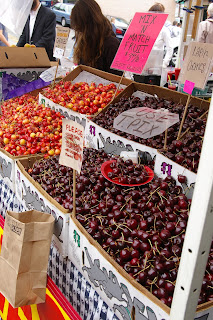 |
| Pike Place Market in Seattle |
Hi blog readers! Are any of you still out there? It’s been awhile since I’ve been on here; turns out life in the unemployment world can still be pretty busy!
I have wanted to do a series of posts about food movements and what I’ve learned about them. I had been wary about posting too much this summer because the more I learned and read, the more complex my opinions became. But I think I’m at a place where I can hopefully (but not finally) offer some insight and feel I’m standing on solid ground. (This first post is a little long for the blogging world, I know, but it will frame things for future posts so stick with me!) Here it goes:
I wanted to start by addressing a fundamental question:
Why does it matter that we talk about where our food comes from?
I had a good friend in Boston tell me he wouldn’t think about where his food came from. For him, food and ethics didn’t mix. For one thing, if he ate local, his home state would only produce fish and potatoes for him to eat year round. I hung onto his statement as I weeded my way across the country wondering if any of my consternation really mattered.
I think his point was: eating is so fundamental, so basic, if you think too hard about it you’ll ruin the beauty of it. And after living near a Harvard world where every shocking headline or new scientific study became a movement, a revolution, I took his skepticism seriously. Marion Nestle, a nutritionist, writes about her own confusion about why people worry so much about food, “For me, food is one of life’s greatest pleasures…[but] eventually I came to realize that, for many people, food feels nothing at all like a source of pleasure; it feels more like a minefield.”[i] To this point, I think my friend is right. We should not be anxious about our food as Nestle suggests – that only exacerbates the symptoms of our disordered eating. But I get ahead of myself.
After sitting in the weeds with my friend’s question long enough, I feel comfortable saying that ultimately I think he was wrong, for many reasons. These questions are complex, as mentioned above, and hard to make sense of (hence the anxiety Nestle talks about). One thing I have found hard is that no one brings the issues together. Books are written about concern the sustainability of our planet, animal rights, food safety, human health, human mental health, body image, economics, or cultural critiques about how we eat (i.e. fast and from a window or microwave).
So here a few of the reasons why, I think, to answer his question, “it matters.”
- To begin by responding to my friend’s comment about eating being so basic: It is because eating is so fundamental, so intimate, that it matters so much that we pay attention. The more we allow a basic element of life to be warped and abused, the more we ourselves become distorted.
Wendell Berry recognizes this distortion in his essay, “The Body and the Earth”. In his discussion about the isolation of the body (from soul, earth, community, etc.) he criticizes the fallacy of the separation of body and soul that is often expressed in religion. He writes:
“You cannot devalue the body and value the soul – or value anything else…contempt for the body is invariably manifested in contempt for other bodies…Relationships with all other creatures become competitive and exploitive rather than collaborative and convivial. The world is seen and dealt with, not as an ecological community, but as a stock exchange, the ethics of which are based on the tragically misnamed “law of the jungle”…The body is degraded and saddened by being set in conflict against the Creation itself, of which all bodies are members, therefore members of each other. The body is thus sent to war against itself.”[ii]
If the health of our being (body & soul) is connected, then things connected to our body, namely food and the animals and earth from which it comes, matters. Ultimately we cannot separate ourselves from our bodies, or the earth, or from one another without bringing harm upon ourselves.
- Americans have a particularly tenuous relationship with food. It is amazing to me the full spectrum of distorted relationships that exist. While many of the food critics out there focus on the ecological problems of food production, many overlook our problems with obesity (and all the health issues related to it), people who struggle with addiction to food (even if they are not overweight), and so many who deprive themselves of nourishment, withholding food for control and distorted body images. Our nation clearly has an eating disorder; perhaps, more then one.
We have diet plans being born each day with new followers eagerly overthrowing their current eating habits for the next quick fix. There are new products invented to excite the shopper (often the child) like Oreo cereal, and fruit snacks “packed with so much real fruit juice your kids won’t know they’re eating fruit.” There are people who don’t know what a tomato plant looks like or that carrots grow underground.
We have 3,900 calories available to each person each day in our country (nearly twice the amount the average adult needs), and yet families still go hungry.[iii]
In contrast to our food world, there are many cultures (I think first of French, Italian, Indian and Latin) that savor the beauty and gift of food, and know how to both create it and enjoy eating it. And there are impoverished countries that know the necessity of food and the limitations of growing it.
My goal in this post and in the ones to come is not to frame these statements in a condemning way that suggests all our food realities are wrong, but rather that something has been lost. Somehow in this place, we have lost sight of both ends of that spectrum.
- Most of us are far enough removed from agricultural ancestors that we don’t know what cows and pigs are supposed to eat, nor what they’re fed now, or how to slaughter and clean an animal for our consumption. Wendell Berry might encourage us to look into this and ask us what that does to our bodies, the earth, and our community. Michael Pollan may ask us to forage our own mushrooms and hunt our own boar. But another voice recognizes the reality that these things are not possible for all of us, and we do have a world of 7 billion people to feed!
James McWilliams is a professor who was first a “locavore” and has written about the failings of the movement. He is still someone who believes that “the quest for sustainable methods of global food production cannot wait,” but he also has some harsh criticisms of the popular food movements that are trying to do just that. In contrast to Berry, Pollan and others who write with nostalgia about the history of agriculture and the woes of industrial farming, McWilliams wants to point out that farming, period, is destruction of the natural state of the ecosystem, and yet at this point a necessary evil.
“No matter how rhapsodic one waxes about the process of wresting edible plants and tamed animals from the sprawling vagaries of nature, there’s a timeless, unwavering truth espoused by those who worked the land for ages: no matter how responsible agriculture is, it is essentially about achieving the lesser of evils. To work the land is to change the land, to shape it to benefit one species over another, and thus necessarily to tame what is wild. Our task should be to deliver our blows gently.”[iv] In short: “domestication reinvents the rules of nature…cultivated plants are nature’s misfits…farming is, at its historical essence, the art of strategizing against the natural world.”[v]
And so you can begin to see, even among those who are searching for sustainable agriculture, among those who recognize there is a problem with the way we do food now, they are divided in their approach. There are those who want to work with nature, to return to it and the wisdom it provides, and there are those who say this is fundamentally impossible.
So it is with the realities of the world of fast-food and industrial farming, the realities the organic, local, slow, vegetarian, vegan, family-farm, sustainable living, permaculture, and raw food movements, and with the reality that we must feed a nation, a world, whose population has long been exploding, I enter into questions about food – because whether or not I’ve settled for one food movement, or worked out all the details about what I think our priorities should be in food production, I did solidify one thing on my journey, it indeed, does matter. It matters because it is not only an ecological issue, but it is a health issue for us, a mental health issue, and a spiritual issue that has long needed to be addressed as such.
And hopefully rather than convert you to any one movement, or convince you to start up your own farm and slaughter your own chickens (a misconception of readers from an earlier post), I can at least convince you to pay attention to not only where your food comes from, but how you eat, and ask yourself which pieces you think matter most to the earth, your health, your mental health, the health of your community, and your spirituality.
[i] Marion Nestle, What to Eat (New York: North Point Press, 2006), p. 3-4.
[ii] Norman Wirzba, Ed., The Art of the Commonplace: The Agrarian Essays of Wendell Berry (Berkley: Counterpoint, 2002), 101.
[iii] Nestle, 11.
[iv] James McWilliams, Just Food (New York: Back Bay Books, 2009), 9.
[v] McWilliams, 7.










































